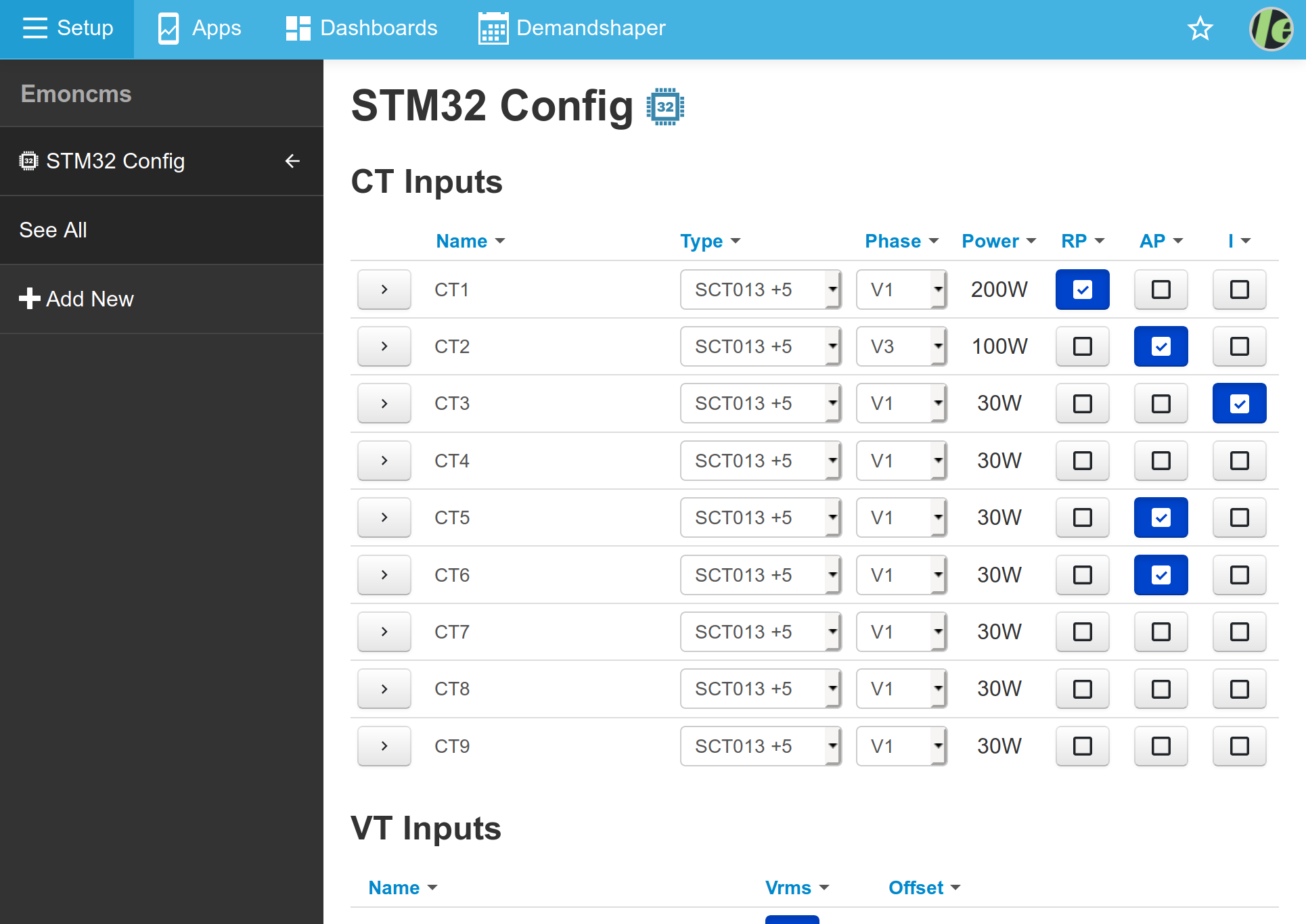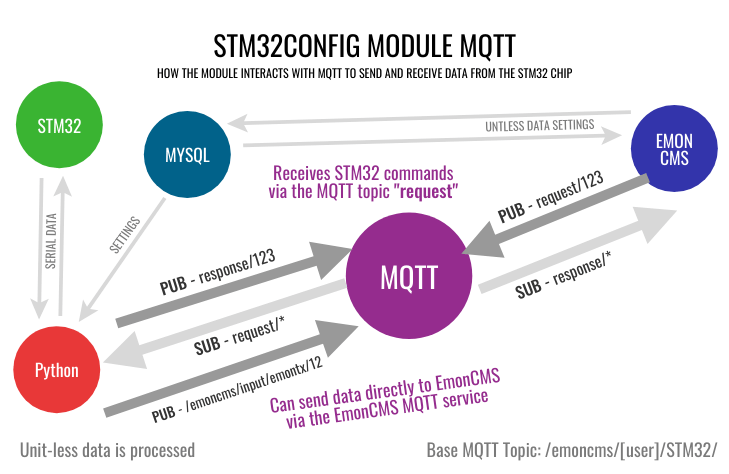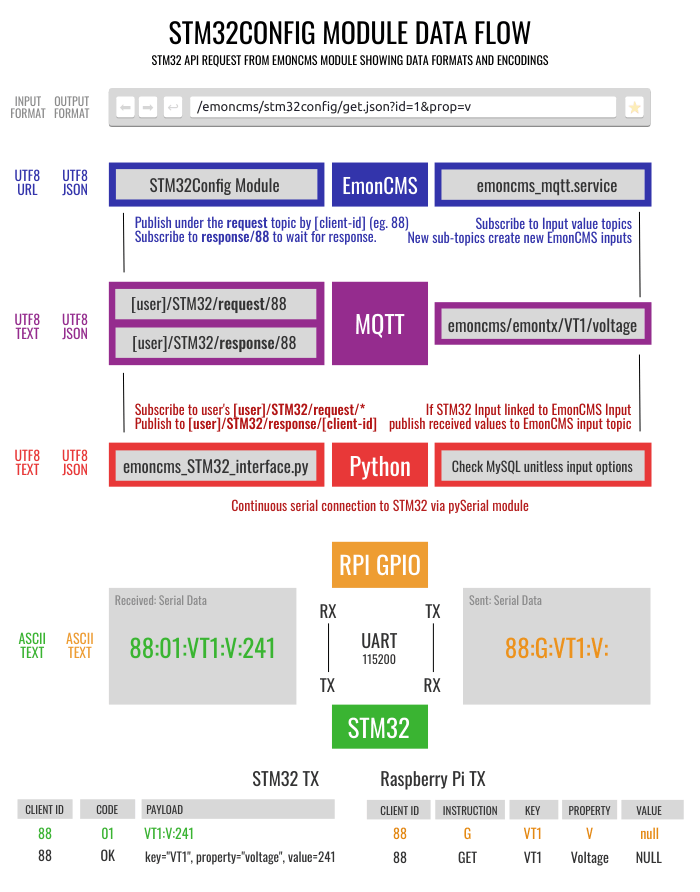Emoncms configuration module for raspberry pi based installations of emoncms with an stm32 based emonBase
 [screenshot of Module page displaying STM32 inputs]
[screenshot of Module page displaying STM32 inputs]
clone this repo:
git clone git@github.com:emoncms/stm32config.git
create a link to the module directory (stm32config-module) in the emoncms Modules directory.
sudo ln -s [/path/to/this/repo/]stm32config-module /var/www/emoncms/Modules/stm32config
click the STM32Config link in the emoncms sidebar to see the list. eg:
http://localhost/emoncms/stm32config/
The STM32Config Module will subscribe to a specific MQTT "Request topic" that contains the STM32 chip commands.
Once a command is received via MQTT the module will forward the command via serial connection to the STM32 chip.
Using MQTT with this module has another advantage in that EmonCMS is already set up to take input data via MQTT.
This makes is very easy to forward any STM32 serial data to EmonCMS
The hardware serial connection is between UART1 on the STM32 and the UART port on the rPi.
The serial data is divided into Codes, Get/Set Flag, Keys, Properties, and Values.
- Code. This is a way to help organise the set of commands. The code is sent with the commands and is received with the response, acting as a parity check.
- Get/Set Flag. This divides a command into either a request for data (GET) or setting change (SET), such as setting the RTC time.
- Keys. The STM32 chip has input/output ports and devices, KEYS represent Current Transformers, MBUS connections, Input/Outputs and any other sensors.
- Properties. The specific setting of a device. For example, a CT can have Set the burden resistor value, or which VT it's assigned to. Or a VT can have Get the state, i.e. whether or not it is connected.
- Value. The value of the data, could be anything, boolean, integer, float or JSON string for example.
All the KEYS and PROPERTIES have Short Names, listed below.
Here are some examples of the serial command sent to the chip (using action and key short names): eg:
- GET -> CT1 -> Real Power
G:CT1:RP - SET -> VT1 -> Phase = 2.52
G:CT1:RP:2.52
As the python script receives serial data,
the feed is processed and publish the result to a Response topic that matches the original request id.
The original HTTP request to EmonCMS will subscribe to the Response topic and return the results to the user.
The different parts of this system return different data structures:
The module can be interacted with via a EmonCMS page.
Most of the interactions will be done using javascript and displayed to the user using vue.js templates.
The vue.js template requires JSON data given to it with the following success,message,data properties :-
{
"success": true,
"message": "Value received",
"data": [
{
"property" : "voltage",
"key" : "VT1",
"value" : 244.12
}
]
}To keep the serial comms efficient we have used "Short Names" to describe elements in the system. Listed HERE.
To interpret a serial instruction refer to the example table below:
| Short Name | Instruction | Description |
|---|---|---|
| G | GET | Get a Key's value |
| S | SET | Set a Key's value |
| L | LIST | List all Keys |
| SAMP | SAMPLE | Get sequence of Key's values |
| DUMP | DUMP | Get the standard output |
| BAK | BACKUP | Get the config settings |
Within the context of this module the name KEYS is given to refer to the STM32 Inputs, Outputs or any other Devices.
| Key | TYPE |
|---|---|
| CT1-CT9 | INPUT |
| VT1-VT5 | INPUT |
| SYS | SYSTEM |
| LED1 | OUTPUT |
| MBUS | INPUT |
| TEMP | INPUT |
| PULSE | INPUT |
| IRDA | INPUT |
Different KEY types will have different properties. Each property is given a Short Name.
Short Names can conflict across KEY types.
eg. The
Short Name"V" represents differnet properties by theSYSandVT1keys.
| Short Name | Property | Example Key |
|---|---|---|
| V | Voltage | VT1 |
| RP | RealPower | CT1 |
| C | Current | CT1 |
| PF | PowerFactor | CT1 |
| ON | On | LED1 |
| V | Version | SYS |

